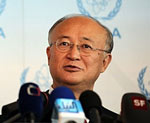 Reuters: The head of the U.N.’s atomic watchdog said he was increasingly concerned on Monday about possible activity in Iran to develop a nuclear missile and accused Tehran of failing to cooperate fully with his inspectors.
Reuters: The head of the U.N.’s atomic watchdog said he was increasingly concerned on Monday about possible activity in Iran to develop a nuclear missile and accused Tehran of failing to cooperate fully with his inspectors.
By Fredrik Dahl
 VIENNA (Reuters) – The head of the U.N.’s atomic watchdog said he was increasingly concerned on Monday about possible activity in Iran to develop a nuclear missile and accused Tehran of failing to cooperate fully with his inspectors.
VIENNA (Reuters) – The head of the U.N.’s atomic watchdog said he was increasingly concerned on Monday about possible activity in Iran to develop a nuclear missile and accused Tehran of failing to cooperate fully with his inspectors.
Yukiya Amano, director general of the International Atomic Energy Agency, told the IAEA’s 35-nation board he hoped to “set out in greater detail the basis for the agency’s concerns so that all member states are fully informed.”
Such a move by Amano would add to pressure on Iran, one of the world’s largest oil producers which is facing tightening international sanctions pressure over a nuclear programme the West suspects has military aims.
“Iran is not providing the necessary cooperation to enable the agency to provide credible assurance about the absence of undeclared nuclear material and activities,” Amano said.
He spoke a day after Iran said it was ready for fresh nuclear talks with major powers, and had sent a letter to European Union foreign policy chief Catherine Ashton.
The Islamic Republic has in recent weeks signalled increased openness and willingness to cooperate with the IAEA about its disputed nuclear work, which it says is for purely peaceful purposes.
But Western diplomats have dismissed this as an Iranian “charm offensive” without substance and an apparent attempt by Tehran to buy time, while it refuses to bow to demands to halt sensitive uranium enrichment.
Since talks between global powers and Iran foundered in January, Russia has advocated a phased plan in which Tehran would address concerns that it may be seeking nuclear weapons, and be rewarded with an easing of sanctions.
Iran has often said it is willing to resume talks. But its insistence that other countries recognise its right to enrich uranium is a major stumbling block, particularly for Western diplomats who see it as an unacceptable pre-condition.
NUCLEAR PAYLOAD?
Uranium enriched to a low level of fissile purity is suitable for running civilian nuclear power plants. If refined to a much higher degree, it can form the core of nuclear bombs.
Amano said Iran had demonstrated “greater transparency” during a five-day visit by a senior IAEA official to the country last month, when it showed facilities the agency had not had access to for several years.
But, “greater transparency and Iran’s full proactive engagement are also needed concerning its other nuclear activities,” Amano added.
Since the IAEA board last met in June, Iran had installed uranium enrichment centrifuges in an underground bunker near the holy city of Qom and also informed the IAEA about planned new uranium conversion activity.
These steps were in “further contravention of Security Council and Board of Governors resolutions,” Amano said.
Echoing the findings of a confidential IAEA report earlier this month, Amano told the closed-door meeting, according to a copy of his remarks: “The agency is increasingly concerned about the possible existence in Iran of past or current undisclosed nuclear related-activities involving military-related organisations, including activities related to the development of a nuclear payload for a missile.”
He said the Vienna-based U.N. agency continued to receive new information about these issues.
For several years, the IAEA has been investigating Western intelligence reports indicating Iran has coordinated efforts to process uranium, test high explosives and revamp a ballistic missile cone to accommodate a nuclear warhead.
The IAEA, tasked with ensuring that nuclear technology is not diverted for military aims, says Iran has not seriously engaged with the agency on these issues since 2008.
Iran says the allegations are forged and baseless. It denies harbouring any nuclear weapon ambitions, saying it wants to refine uranium to generate electricity and produce isotopes for medicine and agriculture.
(Reporting by Fredrik Dahl; Editing by Andrew Heavens)


